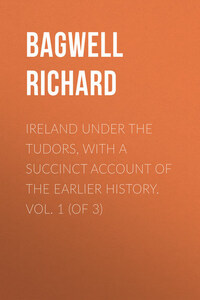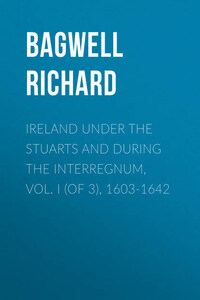‘Irish policy,’ said Mr. Disraeli in the House of Commons, ‘is Irish history, and I have no faith in any statesman, who attempts to remedy the evils of Ireland, who is either ignorant of the past or who will not take lessons from it.’ This is most true, and history, if it is to be of any use, should be written for instruction, and not merely for the confirmation of existing prejudices. This is especially so in the present case, for, as Sir George Stanley told Cecil in 1565, ‘the practises of Ireland be great, and not understood to all men that seem to have knowledge thereof.’ The writer who enters the arena as an advocate may produce an interesting party pamphlet, but he will hardly make the world either wiser or better. The historian’s true office is that of the judge, whose duty it is to marshal all the material facts with just so much of comment as may enable his hearers to give them their due weight. The reading public is the jury.
Starting with this conception of the task before me, I have not attempted to please any party or school. The history of Ireland is at the best a sad one; but its study, if it be really studied for the truth’s sake, can hardly fail to make men more tolerant. In Ireland, as in other countries, a purely Celtic population was unable to resist the impact of the Teutonic race. First came the pagan Northmen, with power to ruin, but without power to reconstruct. Then followed the Anglo-Normans, seeking for lands and lordships, but seeking them under the patronage of the Catholic Church. For a time it seemed as though the conquest would be complete; but the colony proved too weak for its work, and the mail-clad knights failed almost as completely as the Scandinavian corsairs.
The main cause of this second failure was the neglect or jealousy of the kings. They feared the growth of an independent power within sight of the English shore, and they had neither means nor inclination to do the work of government themselves. Little gain and less glory were to be had in Ireland, and Scotch, Welsh, or Continental politics engrossed their attention in turn. They weakened the colony, partly of set purpose, and partly by drawing men and supplies from thence. In short, they were absentees; and, to use an expression which has gained currency in modern times, they were generally content to look upon Ireland as a mere drawfarm.
The Wars of the Roses almost completed the ruin of the work which Henry II. had begun. For a moment it seemed as if the colony was about to assert its independence. But this could not have been done without an understanding with the native race, and it does not appear that any such understanding was possible. The upshot was that Yorkist and Lancastrian parties were formed in Ireland, that the colony was thus still further weakened, and that the English language and power seemed on the point of disappearing altogether.
The throne of Henry VIII. was erected on the ruins of mediæval feudalism, and guarded by a nation which longed for rest, and which saw no hope but in a strong monarchy. The King saw that he had duties in Ireland. Utterly unscrupulous where his own passions were concerned, the idea of a patriot King was not altogether strange to him. Irish chiefs were encouraged to visit his court, and were allowed to bask in the sunshine of royal favour; and it is conceivable that the ‘Defender of the Faith,’ had he continued to defend it in the original sense, might have ended by attaching the native Irish to the Crown. By respecting for a time their tribal laws, by making one chief an earl and another a knight, by mediating in their quarrels, and by attending to their physical and spiritual wants, a Catholic Tudor might possibly have succeeded where Anglican and Plantagenet had failed. The revolution in religion changed everything, and out of it grew what many regard as the insoluble Irish question.
Henry II. had found Ireland in the hands of a Celtic people, for the intermixture of Scandinavian blood was slight and partial. Henry VIII. found it inhabited by a mixed race. From the beginning there had been rivalry and ill-feeling between men of English blood born in Ireland, and those of English birth who were sent over as officials or who went over as adventurers. During the fifteenth century England did nothing to preserve the ties of kinship, and the Celtic reaction tended to swallow up the interlopers. The degenerate English proverbially became more Irish than the Irish themselves, but the distinction would scarcely have been so nearly obliterated had it not been for the change in religion. The nobles of the Pale, the burghers of the walled towns, and the lawyers in Dublin were equally disinclined to accept the new model. Neither Irish chieftains nor Anglo-Irish lords found much difficulty in acknowledging Henry’s supremacy both in Church and State; but further than that they would not go. The people did not go so far, and, in the words of the annalists, regarded the Reformation simply as a ‘heresy and new error.’









